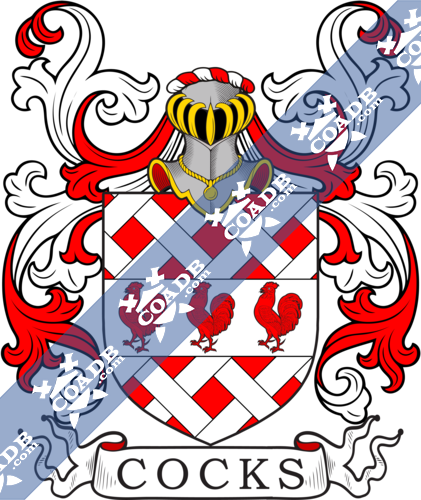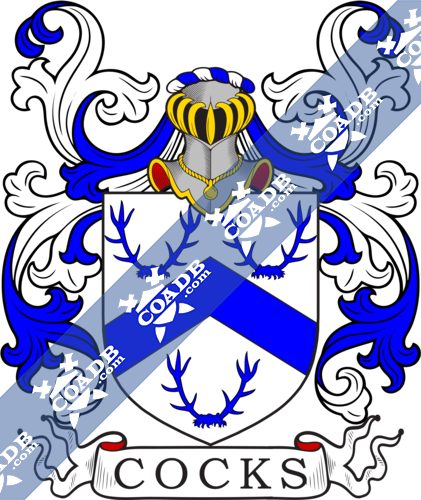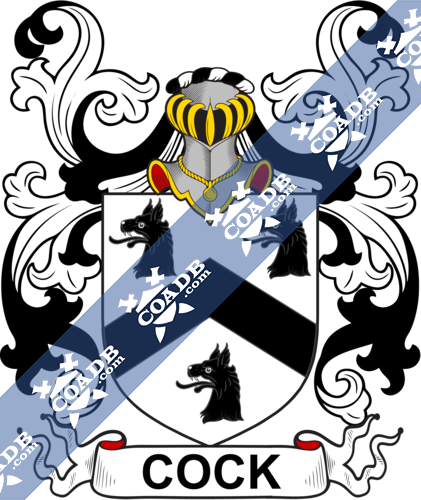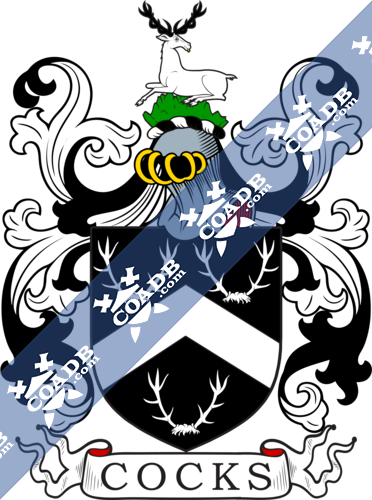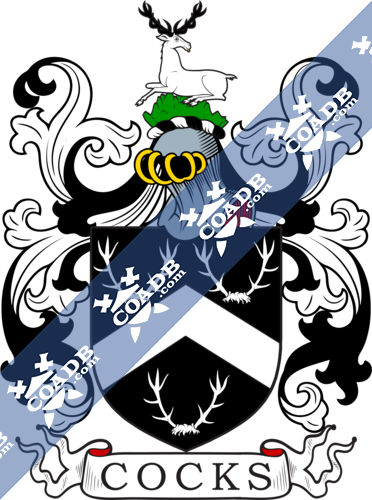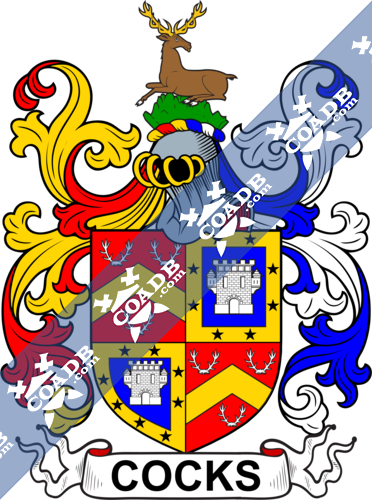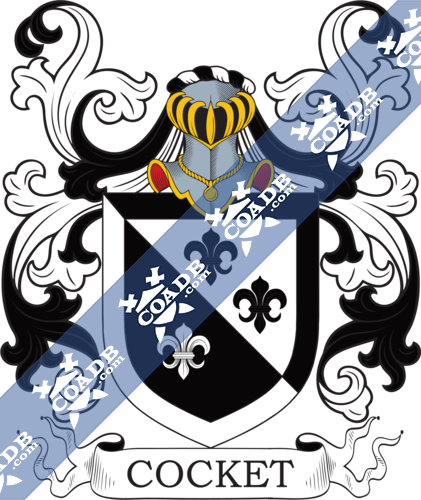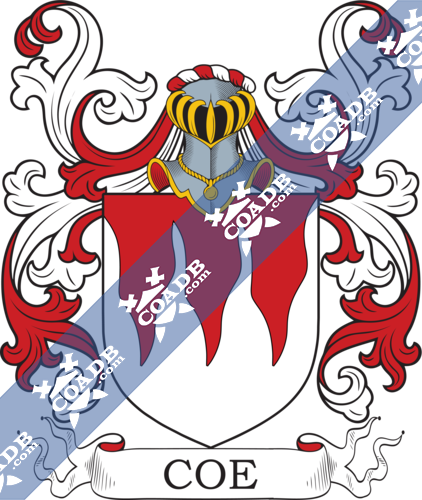Cocks Family Crest, Coat of Arms and Name History
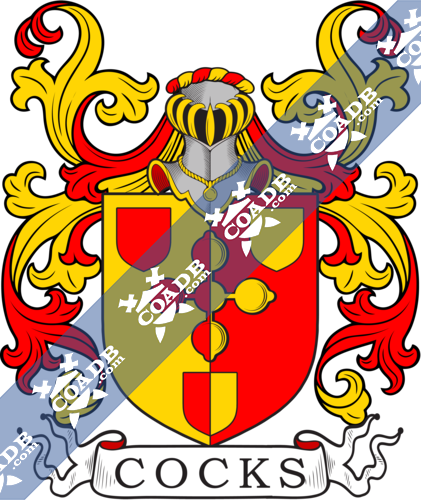
Cocks Coat of Arms Gallery
Don’t know which Coat of Arms is yours?
We can do a genealogical research. Find out the exact history of your family!
Learn MoreCocks Origin:
England
Origins of Cocks:
This interesting surname has many possible sources. The first may have started as a pet name for the bird, the cock, acquiring from the Olde English pre 7th Century “cocc,” and used for a young boy who walked proudly like a cock. The nickname may also have related to a real leader, or an old riser, or an active or determined individual. It may also have acquired from the Olde English appropriate names “Cocc” or “Cocca,” appeared in place names, although not on free record. But as “cock” became a popular term for a boy, it may also have been used affectionately as a specific name. The third possibility is that it may be of geographical origin for a “resident by the hill,” acquiring from the Olde English “cocc” which means haycock, hill or hillock. In London, it perhaps started from the sign of a house or hotel. One William le Cock seems in the Staffordshire Forest Pleas (1271), and Hugh ate Cocke, recorded in the Premium Rolls of London (1319). In the new phrase, the surname has many various spellings containing as Cock, Cocke, and Cocks. In October 1556, Alicea Cox married Burkrave Westdrop at St. Martin in the Fields, Westminster, London.
Variations:
More common variations are: Cockes, Cockis, Coocks, Cockas, Cocksy, Coucks, Coks, Cocs, Cocksey, Cockius.
England:
The origins of the surname Cocks appeared in Herefordshire where people held a family seat from old times. Someone say better before the invasion of Normans and the entrance of Duke William at Hastings1066 A.D.
The very first recording spelling of the family was shown to be that of Aluuinus Coc, dated about 1086, in the “Domesday Book of Cambridgeshire.” It was during the time of King William 1st, who was known to be the “The Conqueror,” dated 1066-1086. The origin of surnames during this period became a necessity with the introduction of personal taxation. It came to be known as Poll Tax in England.
Ireland:
Many of the people with surname Cocks had moved to Ireland during the 17th century.
United States of America:
Individuals with the surname Cocks landed in the United States in two different centuries respectively in the 17th, and 18th. Some of the people with the name Cocks who arrived in the United States in the 17th century included William Cocks arrived in St Christopher in 1635. Win Cocks landed in St Christopher in 1635. Edward Cocks, who came to Virginia in 1651. George Cocks and John Cocks, both landed in Maryland in the same year 1662.
The following century saw much more Cocks surnames arrive. Some of the people with the name Cocks who arrived in the United States in the 18th century included Hen Cocks, who came to Virginia in 1701. Philip Cocks, who landed in New England in 1722. James Cocks landed in America in 1772.
Australia:
Some of the individuals with the surname Cocks who landed in Australia in the 19th century included Japhia Cocks arrived in Adelaide, Australia aboard the ship “Buckinghamshire” in 1839. Japhia Cocks and Ann Cocks, both arrived in Adelaide, Australia aboard the ship “D’Auvergne” in the same year 1839. William Cocks and Henry Cocks, both arrived in Adelaide, Australia aboard the ship “Waterloo” in the same year 1840.
New-Zealand:
Some of the population with the surname Cocks who arrived in New Zealand in the 19th century included Edward Cocks and Louisa Cocks, both arrived in Auckland, New Zealand aboard the ship “Claramont” in the same year 1863.
Here is the population distribution of the last name Cocks: Australia 2,540; England 2,103; South Africa 895; United States 889; Canada 329; New Zealand 317; France 147; Wales 147; Scotland 98; Malta 78.
Notable People:
Von Cocks was an Australian cricket judge.
Charles Cocks was a British 19th-century wine champion, writer of Cocks & Féret.
Clifford Cocks was a British cryptographer.
Richard Cocks was an English merchant in Japan in the seventeenth century.
Blazons & Genealogy Notes
1) (Earl Somers). Motto—Prodesse quam conspici. (Dumbleton, co. Gloucester, bart.; extinct 1765). Sa. a chev. betw. three stags’ attires ar. (Earl Somers is entitled to quarter the arms of Somers, viz., Vert a fesse indented erm.) Crest—On a mount ppr. a stag lodged reguard. ar. attired sa. Supporters—On each side a lion erm. gorged with a collar indented vert.
2) (granted to Katherine, Countess of Stamford and Warrington, dau. of Henry Cocks, Esq.). Per pale or and gu. a quaterfoil betw. three escocheons all counterchanged.
3) (cos. Gloucester and Suffolk). Sa. a chev. betw. three stags’ attires, fixed to the scalps, ar. Crest—On a mount vert a stag lodged ar. attired sa. (another, the stag reguard.).
4) (co. Dorset). Gu. fretty ar. on a fesse of the last three cocks of the first.
5) Ar. a chev. betw. three stags’ attires, fixed to the scalps, az.
6) (co. Lincoln). Motto—Prodesse quam conspice. Quarterly: 1st and 4th, gu. a chev. or, between three attires of a stag, affixed to the scalps ar.; 2nd and 3rd, az. a tower with two side-pieces ar. within a bordure or, charged with eight mullets sa. Crest—On a mount a stag lodged reguard. ppr.

